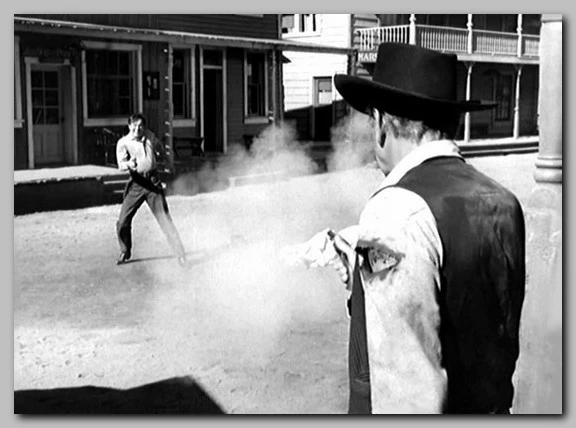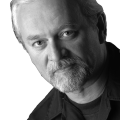News & Articles
Browse all content by date.
 The final shootout in High Noon. Screenwriter Carl Foreman intended the Western to be an allegory for the Communist witchhunt being conducted by Congress in the late 1940s and early 1950s. Foreman himself was blacklisted for refusing to name names.
The final shootout in High Noon. Screenwriter Carl Foreman intended the Western to be an allegory for the Communist witchhunt being conducted by Congress in the late 1940s and early 1950s. Foreman himself was blacklisted for refusing to name names.
While many think American politics has entered a nightmare world unlike any in its past, that’s not true. It’s really just business as usual in America, with different players playing different dark games.
Think how burdensome life must have been early in the Cold War when Congress was crazy with anti-Communist hysteria and became intent on rooting out suspected commies working in government and the arts.
We know that period as McCarthyism, named after Senator Joe McCarthy from Grand Chute, Wisconsin, who, along with future Trump mentor Roy Cohn, conducted a communist witch hunt in government halls as chair of the Government Operations Committee.
But the purges and blacklisting began long before McCarthy, and it started in the House, not the Senate.
What we know today as McCarthyism began in 1938 with the formation of the House Un-American Activities Committee (HUAC), which was charged with keeping tabs on those who might pose a threat to America – subversives, commies, immigrants and various other weirdoes (but not the Ku Klux Klan, which at least one member declared was an American institution).
Things ratcheted up post-World War II when in 1946 the committee of nine Congressmen was made a standing committee and given the directive by new public law 601 to investigate anyone or anything that posed a threat to “the form of government as guaranteed by our Constitution.”
In 1947 the committee held a nine-day hearing on communist influence in Hollywood, leading to the high profile case of the “Hollywood Ten,” 10 writers and directors who refused to testify so were cited for contempt of Congress and subsequently fired by the studios where they worked.
But in the coming years, hundreds more were blacklisted or graylisted in film, theater, radio and the new medium of television as a result of HUAC’s reign of terror.
Specifically, the committee wanted people to name names of other supposed commies and subversives when they testified. It was a very nasty time. To not testify, knowing that you were destroying your career, was an act of moral courage, and many took that high road.
One of them, Carl Foreman, made a movie about it, an Oscar-winning movie that is considered a classic, not only in its genre, a Western, but a classic American film period.
High Noon is the movie Foreman wrote, the story of a man left alone by colleagues and friends to face impossible odds – a quartet of murderous gunslingers on a mission to kill the man.
Gary Cooper took a huge cut in pay to play the lead of Marshal Will Kane in the low budget Stanley Kramer/Carl Foreman movie, and he poured himself into the role, earning his second Oscar (the first was Sgt. York 10 years earlier).
I find it hilarious that commie-hating John Wayne was first offered the role of Marshal Will Kane in High Noon but after reading the script thought the character was a pantywaisted poser compared to the archetypal hardass cowpokes he usually played. He later complained that the movie “was the most un-American thing I’ve ever seen.”
Was Wayne being perceptive and actually getting Foreman’s allegory of a man showing moral courage under trying times?
The story is simple, told in real time, and always with a clock ticking away somewhere, building the suspense to the final showdown of Will Kane alone against four hombres who want him dead.
One of the four Oscars earned by this movie is for best editing (Elmo Williams was the editor). Constantly cutting to clocks as the fateful high noon approaches is one of the reasons for the editing award. It sets a suspenseful pace as Kane finds no one willing to back him up against the killers. In fact, everyone in town wishes he would leave. They figure the bad guys want to kill Kane, so if he leaves they won’t stick around Hadleyville.
But Will Kane doesn’t run from trouble. He sees it as his civic duty to face the bad guys.
We meet Kane on the day of his marriage to a beautiful young Quaker woman, played by newcomer Grace Kelly. We quickly learn the only way the Quaker lady would marry Marshal Kane is if he set down his guns and badge and takes up a new life as a storekeeper.
Kane’s replacement isn’t due in town until the next day, so Kane is reluctant to give up his badge, but the handful of townsfolk attending his wedding say he had done such a good job cleaning up the town that they’ll be just fine until the new marshal arrives.
But, no. Just after the wedding, the telegraph operator arrives with a message for Kane – mad dog killer Frank Miller has been released from prison by “Northern politicians,” and is due in town on the noon train. And, more bad news from the telegrapher, Miller’s brother Ben (Sheb Wooley – who in 1958 sang the hit novelty song “The Purple People Eater;” he also wrote the theme song to the TV show Hee Haw) and two other gunslingers (young Lee Van Cleef and Robert Wilke) are waiting at the station for the noon train.
The wedding guests convince Kane that he should stay on track with his wedding plans, and get out of town immediately to start his new life with his new wife.
And Kane reluctantly agrees. But the couple’s wagen hasn’t gotten far out of town before Kane stops the wagon and tells his wife that he has to return and face Frank Miller. She tells him since he’s made his choice, she will be leaving by herself on the noon train.
Then Kane goes on a useless quest to deputize the cowardly townsfolk who were so grateful for his abilities but now just want him to leave.
A couple of men stand up briefly with him until they realize they’d still be outnumbered and outgunned by the bad guys., so they slink off to safety.
That’s Foreman recounting the dilemma of artists facing the might of a House committee bent on ferreting out commies. He had been seeing it happen to colleagues for several years when he was summoned to appear before the committee. He was still writing High Noon at the time.
Once tainted by the HUAC inquisition, Foreman found himself being shunned by former Hollywood friends and challenged by his filmmaking partner, Stanley Kramer.
Many urged him to play along with the committee and name names. His advisers reasoned that he would not be giving them any names they did not already have from other sources.
Committee members handed a list of names to Foreman. They were names that had been provided by other witnesses. All Foreman had to do was name a few of them and no harm done. Foreman answered, “No, but I destroy myself.”
Foreman considered himself an American patriot and progressive who did happen to belong to the Communist Party in the late 1930s, seeing the communists as a force fighting fascism in Europe. Foreman gave up his membership when he joined the Army in 1942, where he has assigned to Frank Capra’s film unit.
Foreman’s dilemma was that his career was peaking just as he was subpoenaed. He didn’t want to hurt that, but he also did not want to be a rat and name friends who had belonged or still belonged to the party.
Appearing before the congressman, Foreman explained that the previous year, like many other members of the Screen Writers Guild, he had signed a loyalty oath saying he wasa not a member of the party. When they asked if he had been a member before signing, Foreman pleaded the Fifth Amendment.
The next day’s headlines said Foreman failed to cooperate with the committee, and that was all it took for KRamer to turn his back completely on Foreman and begin machinations to oust him from the organization and wrest control of High Noon from its creator..
Very interesting, however, that the conservative Gary Cooper stood up for Foreman and insisted he be kept a part of the team. Cooper, who had been languishing with bad scripts for a few years, was so impressed by Foreman's writing skills that he proposed forming a production company with him after the High Noon shoot, but it never came off.
Foreman, his wife and young daughter sought exile in England, where he continued to collaborate with top-notch directors such as Carol Reed on The Key (1958) and David Lean’s The Bridge on the River Kwai (1957).
Foreman co-wrote the script of The Bridge on the River Kwai with fellow blacklisted writer Michael White, but when it won an Academy Award for best screenplay, credit went to French novelist Pierre Boulle, who could neither write nor read English. The day before Foreman died of a brain tumor in 1984, the Screen Writer’s Guild announced that his and White’s names would be restored to the credits of The Bridge on the River Kwai. In 1985 the Academy of Motion Picture Arts and Sciences held a ceremony to present Oscars to the widows of the two writers.
Fifteen months before the ceremony, Foreman learned he was dying from an inoperable brain tumor.
At the Oscar ceremony, Foreman’s wife Eva said, "Fifteen months ago, he learned he was dying. During the time he was very ill, lots of his films were on television, and it hurt to see somebody else’s name on the screenplay for Bridge on the River Kwai.”
| Tweet |


